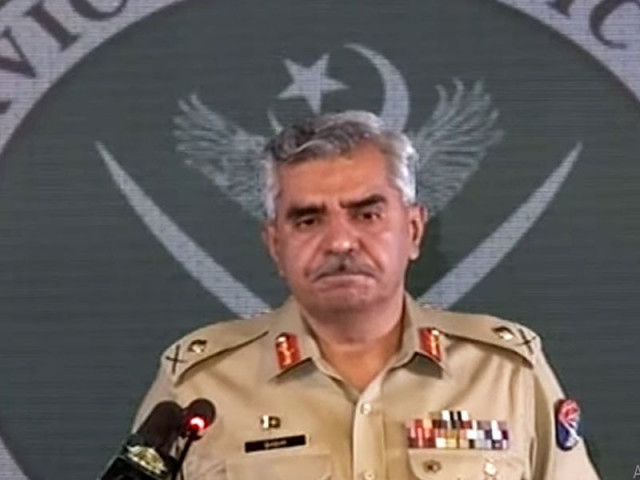New Afghan setup expected to take steps against TTP: DG ISPR
Maj-Gen Iftikhar says Pakistan expects cordial ties with new Afghan govt

Pakistan believed the incoming government in Afghanistan, likely to be led by the Afghan Taliban, would take “effective” measures against the banned Tehreek-e-Taliban Pakistan (TTP), the chief military spokesperson said on Friday.
Speaking at a news conference in Rawalpindi, Director General of Inter-Services Public Relations (ISPR) Major General Babar Iftikhar said that Pakistan expected a “cordial” relationship with the new political dispensation in Kabul.
#Live: DG ISPR @OfficialDGISPR Major General Babar Iftikhar briefs media in Rawalpindi https://t.co/SOSpc1WF7D
— Radio Pakistan (@RadioPakistan) August 27, 2021
The press conference, which comes against the backdrop of unfolding situation in the neighbouring country, focused on the current Afghan situation. The views expressed by the ISPR chief suggested that unlike the concern in various capitals, Pakistan was confident in dealing with the new situation.
The ISPR director general made it clear that Pakistan was prepared to deal with any spill-over of the current Afghan situation and stressed that appropriate steps had been taken to guard against any eventuality.
At the outset, he highlighted the steps Pakistan had taken to prevent negative fallout of the Afghan situation in the country. Maj-Gen Iftikhar particularly mentioned the border mechanism, border fencing and other measures to secure the Pakistani side of the frontier.
Since the fall of Kabul, he said, Pakistan deployed regular troops on the designated border crossings with Afghanistan. Pakistan had kept the border crossings opened on humanitarian grounds since Afghanistan was a landlocked country, he added. Contrary to reports, the chief military spokesperson said there was no influx of new refugees from Afghanistan.
Maj-Gen Iftikhar told reporters that like the rest of the world, Pakistan was not expecting that the situation in Afghanistan would change so rapidly. Pakistan was not expecting of the Afghan defence forces to capitulate in the face of Taliban onslaught, he added.
Maj-Gen Iftikhar elaborated that Pakistan had reached out to Afghanistan on multiple occasions to formalise border mechanisms, as it was felt that it would be the answer to the instability existing along the Pak-Afghan border. However, the Afghan government under Ashraf Ghani did not reciprocate those initiatives.
The spokesperson further said that several high-level visits, including by army chief Gen Qamar Javed Bajwa, were undertaken, while the mechanisms were offered for the training of Afghan soldiers at the military training institutions of Pakistan, but “only six cadets came to Pakistan while thousands of soldiers and officers were trained in India”.
Maj-Gen Iftikhar added that the Pakistan army had conducted multiple counter-insurgency operations on the western border and a massive capacity-enhancement initiative was started in 2017.
“After two decades, we can say we have fought off the menace of terrorism very well with the whole-of-nation approach. All these operations are the epitome of insurmountable spirit and supreme sacrifice by the whole nation,” he added.
“We raised more than 60 wings of FC in Balochistan and K-P, as the force is manning the border amid a spike in cross-border attacks,” he said, adding: “The border fence is a massive undertaking. Just to start this project was a massive initiative, but now more than 90% of the border is fenced.”
Speaking further about the border with Afghanistan, the ISPR director general told reporters that the situation was “fairly normal” along the border as the army took every possible step to maintain security.
Other than the people of Afghanistan, he added, Pakistanis had also been the biggest target of violence in Afghanistan. “There are no major incidents along the border, but this doesn’t mean nothing will happen; we are aware of the threat and fully prepared to thwart it,” he added.
Responding to a question about the banned terrorist organisation TTP, the military spokesperson maintained that the group used Afghan soil to launch attacks in Pakistan with the help of “spoilers”.
“The situation on the other side of the border is very fluid. We believe the Taliban government will take effective measures to ensure that TTP doesn’t use Afghan soil to target Pakistan or other countries.”
Maj-Gen Iftikhar said that the militant group no longer has any infrastructure or organisational presence in Pakistan. He added that the country had been “repeatedly cautioning the world about the negative role played by spoilers” in Afghanistan, which were still continuing to do so.
Elaborating further, the military spokesperson said that while the country’s armed forces were conducting security operations on the western border, there were “massive” ceasefire violations (CFVs) on its eastern border.
When asked if the establishment of an Islamic emirate in Afghanistan would affect Pakistan, Gen Iftikhar said that Pakistan was already an Islamic country with its Constitution being in accordance with Islamic laws. “It (Taliban rule) will not affect us,” he insisted.
“Whatever has happened in Afghanistan, we need to understand the role of India. Whatever investments India made in Afghanistan, it was all done with the sole intention to harm Pakistan. They have no love lost for Afghan people or Afghanistan.”
The military spokesperson pointed out that the Indian intelligence agency RAW was responsible for cobbling up an alliances between the TTP and the militant Islamic State group. He added that the international community needed to put India at the dock for its negative role in Afghanistan.
Gen Iftikhar clarified that no refugees were pouring into Pakistan. “Border crossing is not closed, but Pakistan is only allowing Afghans who have documents. People are moving on both sides of the border with proper documents. It is not free for all,” he said.
“There is reason to be optimistic [about] the way things are,” he said, while talking about the ties with the future Afghan government. “Pakistan expects a cordial relationship with the new Afghan government,” he said.
To another question, the chief military spokesperson said that Pakistan was ready to assist the new political dispensation in Afghanistan for security and military training. Like the past, he added, Pakistan was willing to extend cooperation to the new government in the neighbourng country.
When asked about the recent attacks on the Chinese nationals, the ISPR director general stressed that security would be beefed up if needed and the interior ministry was responsible for their protection.



















COMMENTS
Comments are moderated and generally will be posted if they are on-topic and not abusive.
For more information, please see our Comments FAQ